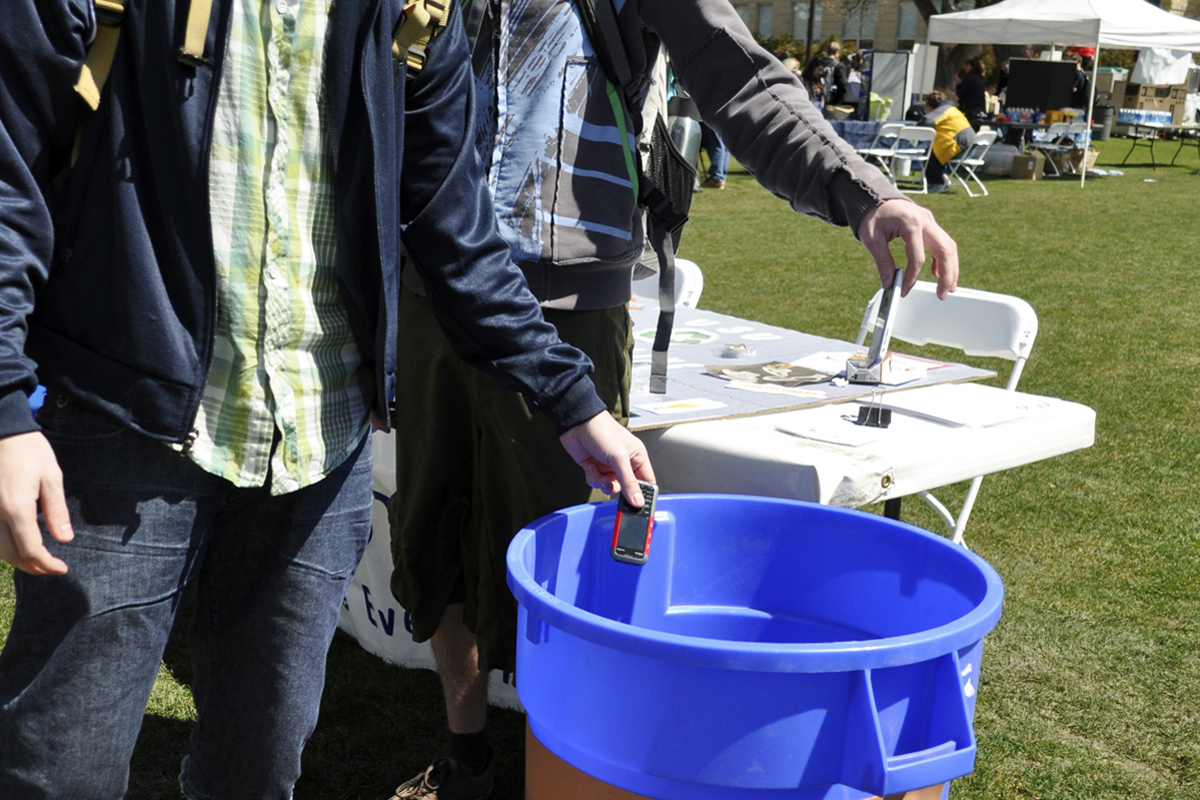USU Recycling collects e-waste
In an Earth Day effort to promote sustainability and protect the environment, USU Recycling encouraged all Cache Valley residents to drop off their old electronic devices at either Romney Stadium or the Quad on Friday.
Following this effort, USU Recycling employees are still collecting old cellphones, computers, televisions, printers and other devices to be recycled. The goal is to raise environmental awareness and provide the public with more disposal options, said Kevin Phillips, manager of resource recovery at USU.
“Every year USU Recycling tries to do something out of the ordinary,” he said. “We do not normally collect computers from the public, because it is quite expensive to make sure they’re recycled correctly. But, once a year on Earth Day, we try to offer that as a public service as best we can.”
In a 2009 report conducted by “60 Minutes,” it was noted that an estimated 130,000 computers are disposed of daily and 100 million cellphones annually, and because such devices are often donated to aid in foreign countries, problems arise from lack of knowledge and safety procedures.
Phillips referred to reported incidents where African children, the recipients of old computers, were ignorant of the devices’ uses and damaged them in campfires, which inflicted various forms of cancer and diseases on the children due to the hazardous material components.
USU Recycling partnered with the Salt Lake City branch of Simply Mac, who offered to dispose of and pay for the items if USU found the means to transport them to Salt Lake City. Since Simply Mac has offered their services, Phillips said it will be easier to host electronics collections on a yearly basis.
Lisa Tobias, the education coordinator of USU Recycling, said, “Usually Logan recycling takes electronics, and also the dump takes them. We don’t usually because it costs money for them to be disposed of. Since this is all free, that’s why we’re trying to promote it.”
Phillips said that electronics waste (e-waste) is the biggest challenge across America because of the sheer volume of the e-waste that’s hitting the markets. Since most people have electronics, he said, the problem is much larger.
He said there are many environmental health and safety problems that result from computers in particular that aren’t recycled or disposed of properly. Computer monitors, like television screens, contain lead and are considered hazardous waste.
A further danger, said Phillips, is when computers are thrown in the garbage and left alone. “That beats the heck out of me,” he said. “I don’t know what people are doing with their old computers. I hope they’re not putting them in the trash can, but maybe they are.”
Phillips said many corporations that have created the problems are now taking responsibility for them, but that, he said, is useless without the public realizing the benefits of recycling their electronics.
“There has been pressure for computer companies to step up, and finally, Mac has,” he said. “It’s a shame if they step up and do this and we as the public act like we don’t care.”
He added that recycling electronics hasn’t really caught on to the public, but that if it did, it would make a world of a difference.
Utah State already mines minerals and collects precious metals when recycling computers, he said, and USU Recycling recycles about 25 percent of the university’s main waste stream. He added that other sustainability efforts are happening all over campus; an example is in the field south of the Spectrum where a giant water tank is being placed. It will circulate water through campus during the summer and save approximately $100,000 a year from electricity bills, he said.
Any efforts the public can make to help the environment would make a large difference, Tobias said. With students moving away from campus for the summer or graduating, Tobias said, now is the time for USU students to help out the environment by taking their old cellphones and other devices to the Recycling Center.
“There are a lot of things the university is trying to do to decrease its footprint on the environment,” Phillips said, “and this is one little part that we can do.”
Items will be collected at the Recycling Center until Thursday, April 28.
– ariwrees@gmail.com

